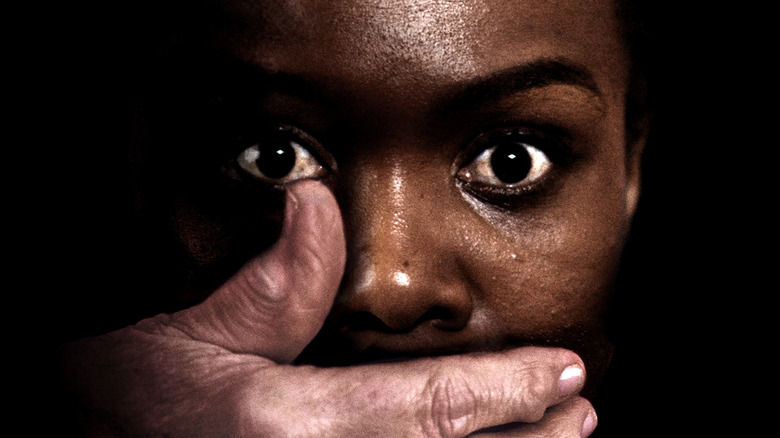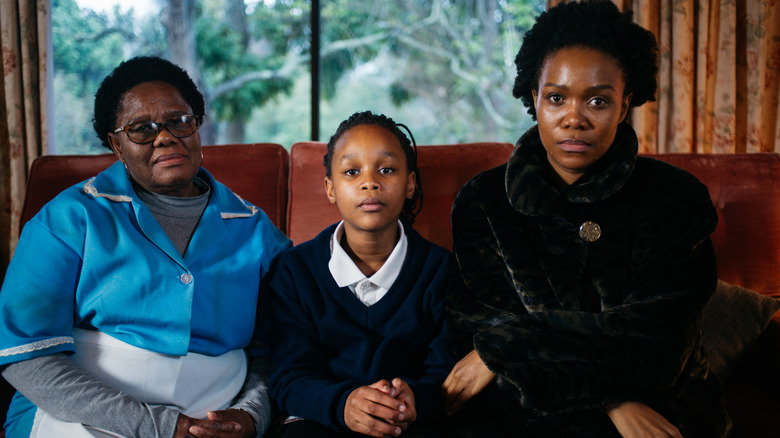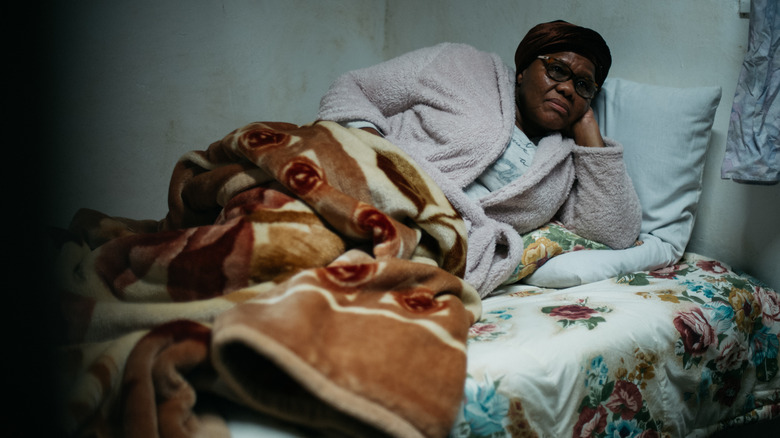Good Madam Review: A Haunting Post-Apartheid Horror About Racial Inequity And Generational Trauma
"We should pretend not to be here, even though we are?" Winnie asks her mother. "Yes," Tsidi replies. By the pained look on Tsidi's face, you know she wishes her nine-year-old daughter never had to ask this question. But these questions, rooted in racial inequity, are exactly what director Jenna Cato Bass raises in her horror film, "Good Madam." Set around three generations of Black South African women, "Good Madam" explores the systemic power imbalances and intergenerational trauma haunting the post-apartheid era.
Although that might sound too ambitious a feat for one film to cover, Bass successfully accomplishes this goal by threading these larger issues into a focused story about the toxicity of South Africa's Maid-Madam dynamic. Through witnessing the daily life of one domestic worker, "Good Madam" covers a lot of emotional and political terrain in a tight 92-minute runtime — including topics like landlessness, homelessness, slavery, and poverty.
"Good Madam" opens with a zoomed-in view of a gurgling sink drain, which immediately floods the senses with dread. We then meet Tsidi (Chumisa Cosa), a single mother grieving the recent loss of the grandmother who raised her. After a family fight, she leaves their shared home in Gugulethu with her daughter Winnie (Kamvalethu Jonas Raziya) to live with her mother, Mavis (Nosipho Mtebe). Tsidi's mother works as a live-in domestic worker for an elderly white woman named Diane. The second Tsidi steps into the Madam's home, whispers of an evil supernatural presence arrive. Something is also off with Mavis.
An allegory for healing intergenerational trauma
The plot of "Good Madam" focuses on how racial inequity fractures a family unit. "Good Madam" is not a jump-scare-fueled horror film. There's no loud score or third-act twist. Prepare for a crescendo-like pace from a film that asks you to turn off your phone, settle in, and listen carefully. In "Good Madam," characters conceal more than they reveal, adding intrigue to each discussion. Most of "Good Madam" depicts mothers and daughters arguing for their needs — regardless of how their approach hurts one another. Winnie doesn't want to live in a "dirty" place again. Tsidi is furious with her mother, as she thinks Diana has enslaved Mavis and that her mother is okay with that fate. Mavis doesn't want to challenge Diane for fear of losing their family's housing. The threat of homelessness is palpably apparent throughout the film, bringing a heavy dose of daily life horror that keeps the film's stakes high. Even when things begin to get weird in the house, and they do, the anxiety of not having any home makes the characters' choices to leave or stay compelling difficult.
Visually, this psychological horror film excels. No detail is inconsequential. Most props (even if they're in a shot for a short time) carry a lot of emotional weight to them — such as how Diane has hung up photos of her family's past "workers" in her living room. Or the sweeping shots of Diane's untouchable china collection whereas Mavis has only one mug to use. Images of the past merge with the present as a metaphor for the cyclical trauma Tsidi is sifting through — fearing she's becoming her mother while trying to raise a Black daughter.
Refreshingly tight-runtime with a fantastic finish
Of the tight and formidable cast, Chumisa Cosa and Nosipho Mtebe steal the show. The duo brings such beautiful depth and pathos to their mother-daughter relationship. Their dialogue feels effortlessly natural, which makes their half-truths to one another land in resonating ways. In part, this chemistry is likely due to both stars' contribution to the film's script.
As a white South African director, Bass ensured the entire cast had a say in workshopping the film's story. She encouraged them to draw from their past experiences to create as authentic a film as possible — and it paid off. Bass co-wrote the script with stars Babalwa Baartman (also credited as a producer), Jenna Cato Bass, Chumisa Cosa, Chris Gxalaba, Khanyiso Kenqa, Steve Larter, Sizwe Ginger Lubengu, Nosipho Mtebe, Kamvalethu Jonas Raziya, Sanda Shandu, Siya Sikawuti, and Peggy Tunyiswa.
"Good Madam" takes its time to linger on subtle and chilling notes before unveiling its fantastic finish. The only drawback to the film is it hints at more supernatural events than we ever see play out on-screen. Considering (and without spoiling) how that pans out, it's tempting to imagine a version of this film with a handful of more horror beats to show the racial violence and abuse felt by the main cast. When it does go there, it's extremely powerful and has a great balance of just how much gore to show without spilling into exploitative territory. That being said, "Good Madam" still lands as a moving allegory for healing the intergenerational trauma specific to the experience of Black South African women.
/Film Rating: 8 out of 10


